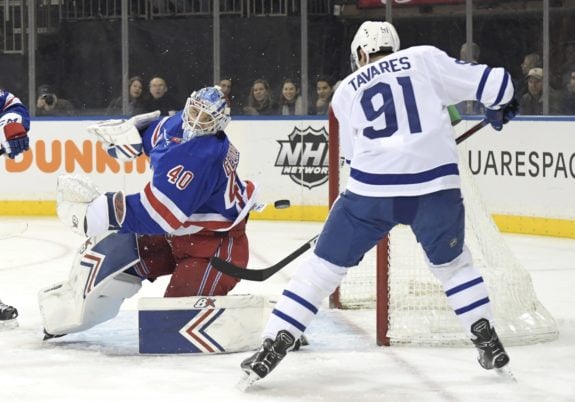With a new season around the corner comes a new year of The Hockey Writers’ Maple Leafs Round Table. New faces donning the blue and white, with commentary from new faces here at THW.
While there’s been a lot of commentary surrounding the issue, we have yet to set up a group discussion on the Mitch Marner negotiations and where the Toronto Maple Leafs stand with their young star winger. With that, I’m joined by Brenton Kemp and Peter Baracchini at the round table to discuss whether or not the Maple Leafs should give Marner’s camp a deadline to get a contract signed.
Forbes: Players Do It, Why Not Teams?
We all remember how Marner didn’t want to negotiate an extension during the NHL season in 2018-19. He, along with his camp, stood firm on the fact that there wouldn’t be contract talks and distractions while the season was in full force. At least that was what was said by his agent Darren Ferris back in November 2018.
So, the Maple Leafs and Marner played out the year. Marner finished with a career-best in goals (26), assists (68) and points (94), while leading the team in the final category. He, like most of the Maple Leafs players, had a few impressive games in the postseason, but ultimately crumbled in the deciding games.

Now, reports are all over the place regarding what he wants and what the team wants to pay him. Some are saying he’s seeking Auston Matthews money and deservedly so, while others believe that two sides are stuck on the length of the contract. Either way, that’s irrelevant in the discussion of whether the Maple Leafs should give a deadline of their own.
You’ll hear my colleagues mention the NHL’s Dec. 1 RFA deadline – one the Maple Leafs are far too familiar with. But what if Kyle Dubas provided the Marner camp with one of his own. We saw how William Nylander played following negotiations that spanned nearly two months into the season. It wasn’t great. He missed training camp, preseason and much of the first two months of the regular season. Can the Maple Leafs really allow for that to happen again – especially with a player of this magnitude?
Related: Maple Leafs Should Let Marner Sit for the Season
So, why shouldn’t the Maple Leafs set a deadline of their own? Sure, it’s dangerous. Sure, it might create animosity between Marner and the Maple Leafs. But, in the end, the team needs to look out for its own best interests heading into the season. They don’t need distractions either.
Enter the no-distractions deadline, the team version. They don’t have an agent to be their spokesperson, but they have a voice of their own. Maybe they don’t want the distraction again of a star player not signing because he’s not getting paid what he feels he’s worth. Maybe they want to focus on getting the job done on the ice and not the particulars off of it. Maybe they want their players present at training camp, during preseason and in the opening night lineup.

Heck, the players can set a deadline of when negotiations need to stop. Why can’t the team? Maybe it’s time for teams to do that with this particular RFA class.
Kemp: Negatives to Marner Deadline
Leafs Nation remains haunted by the contract stalemate that took place with last year’s major restricted free agent (RFA), Nylander. As we’re well aware, Nylander’s holdout lurked almost two full months into the regular season before a deal got done in the final minutes before the NHL-imposed Dec. 1 5:00 PM ET deadline. Nylander would go on to largely struggle after missing so much time, posting just seven goals and 27 points in 54 regular season games, his 0.50 point-per-game clip falling well short of the 0.75 mark he established over the previous two seasons.
To many, the Marner situation seems far too familiar. The last thing the Maple Leafs need is a repeat of the Nylander situation in which a vital piece of the roster performs at two-thirds of what they have proven capable of. However, there’s no need for a deadline here, and here’s three reasons why:
1. If there were to be a deadline, when should it be? When training came commences on Sept. 13 in St. John’s? The beginning of the regular season? End of October? To me, there’s no quantifiable avenue to discover exactly the proper time for a team-imposed deadline.
2. Forcing your top point-getter in each of the last two seasons to sign or go home by a certain date is an extremely dangerous practise. Sure, Nylander scuffled after missing camp and two months of the season, and while it would be tough for any NHL player to produce at 100 percent after missing two months and returning at a time when teams are rounding into form, Marner appears to be cut from a different cloth than his teammate. Marner is a driving force and elite playmaker while Nylander’s success can be linked to skating with an elite goal-scorer in Auston Matthews in the 2016-17 and 2017-18 seasons.

3. John Tavares has always been a productive NHLer, however I’m not convinced it was a coincidence that he shattered his previous career-high of 38 goals with 47 while skating alongside Marner in his first season in Toronto. No, Tavares didn’t learn how to score goals just 11 months ago, however I would argue Marner was the leading factor in having the 10-year veteran reach career-highs last season. You want Tavares producing at 100 percent, and it’s hard to imagine him doing so without Marner and their dynamite chemistry from a season ago.
Odds are general manager Kyle Dubas gets this thing done in good time. It’s bad for everyone – including his reputation as an NHL GM – if negotiations with an important RFA linger into the regular season after what happened a season ago. Marner missing the preseason wouldn’t hurt, but regular season time would.
Related: Predicting the Maple Leafs’ Power Play Units
Considering the NHL already has a deadline in place for such negotiations, there isn’t a need for Dubas to impose one himself. Anything else would be playing with fire.
Baracchini: Deadline? Why Not?
Contract talks and negotiations are a difficult and nerve-wracking process. Some players want to work things out during the season while others want to hold out until the offseason to avoid distraction and maximize their value.
This was the case with Marner. While fans and the media are anxious to see whether or not a deal gets done, these things tend to play themselves out. The NHL has a limit to when an RFA can sign – something Maple Leafs fans are all too familiar with thanks to the Nylander negotiations last season. But teams should have a set deadline in order to have the players sign and be ready before training camp starts.

Let’s be clear, the Maple Leafs aren’t the only team affected by this. Brayden Point, Mikko Rantanen, Patrick Laine, Kyle Connor, Matthew Tkachuk and many talented players could miss training camp and possibly game time without a deal. In order to have everyone ready and at their best, teams should have a deadline set. If teams want to have the best roster possible, a deadline could help out instead of having this process drag on.
Either way, the ideal situation would be for the Maple Leafs to sign Marner. He’s a strong commodity on a team that is clearly in a win-now frame of mind. Deadline or not, you can be sure that neither side wants this to drag into the season – even in the slightest.
While we’ve had our say on the possibility of a team-set deadline, what are your thoughts on the matter? Be sure to share your thoughts by commenting below, or tune in next time for more from the Maple Leafs Round Table.